by Heather Plett | Aug 28, 2012 | calling, circle, Community, family, journey, prayer, Trust, women
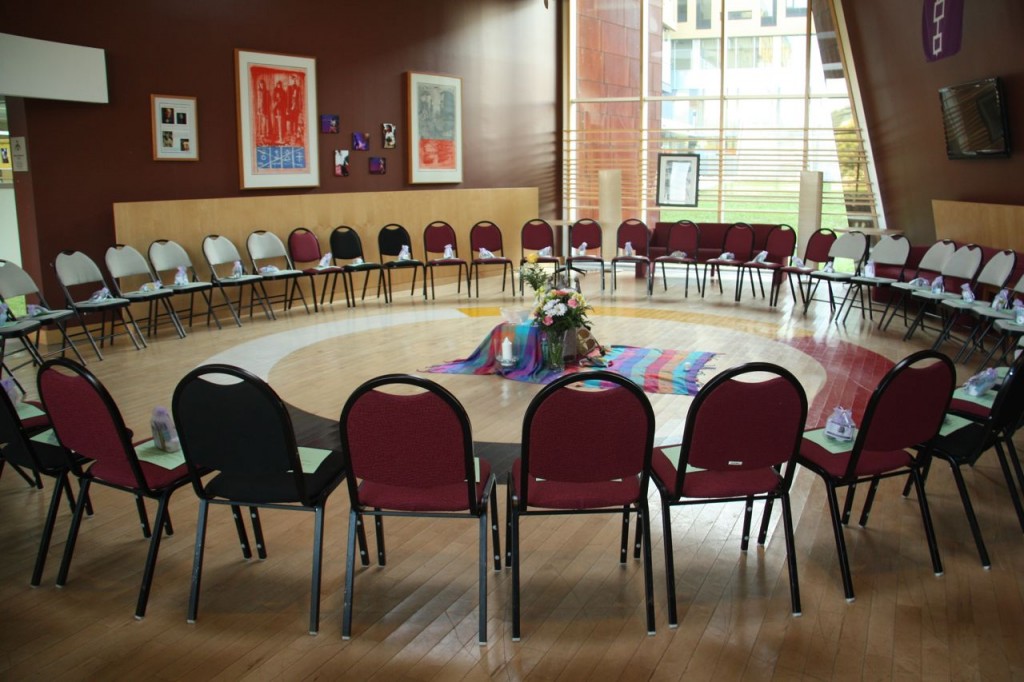 It seems appropriate and metaphorical that my journey to the Gather the Women event I was co-hosting was a long and arduous journey, and yet filled with moments of beauty and grace. The thirty-five hours I’d planned to spend on a train turned into forty-five and a half. I’d looked forward to the many hours of reading, writing, contemplation, and staring out the window (especially after the hard week before), but there’s only so much of that a person can take before the body begins to complain.
It seems appropriate and metaphorical that my journey to the Gather the Women event I was co-hosting was a long and arduous journey, and yet filled with moments of beauty and grace. The thirty-five hours I’d planned to spend on a train turned into forty-five and a half. I’d looked forward to the many hours of reading, writing, contemplation, and staring out the window (especially after the hard week before), but there’s only so much of that a person can take before the body begins to complain.
The moments, though, when I watched a moose run across a pond, or a great blue heron flap its mighty wings as it lifted itself out of the water, or a perfect circle of sunlight streaming out of a dark cloud, made the difficult journey bearable.
When I finally arrived in Peterborough, along with the other three members of the planning committee, I was weary but excited for what the next four days would bring. Forty-five women were gathering from across North America to sit in circle, share stories, and honour their feminine wisdom. I felt incredibly humbled to have the opportunity to host such a gathering. (Side note: I just realized that there was one woman for every hour I spent on the train! That thought makes me smile.)
The night before the gathering was to begin, I got bad news that almost convinced me to return home. The results of my Mom’s CT scan had come back. It was confirmed that the cancer she’d been treated for over the past year was still growing in her abdomen. Grief swept in and encompassed me. I didn’t know how I would make it through the rest of the week and do the job I needed to do.
I shared the news with the planning committee, and they surrounded me with love and community. “Go home if you need to,” they said. “We’ve got your back.”
The next morning, I decided I’d stay. Something told me that being part of this circle of women would help me have the courage to return home to what I needed to face.
It wasn’t easy. The details of gathering – putting together registration packets and gift bags, writing flip charts, and cutting string for my creative workshop – felt so trivial in light of what I was dealing with. At the same time, though, creating a space of comfort and inspiration for the women who were traveling many miles (literally and metaphorically) to be there was not trivial at all.
Before the opening circle began, I stepped into the room where creative women were preparing to sell their art in a small marketplace. Near the entrance was the beautiful art of Maia Heissler. She was in the midst of hanging her beautiful Forest Friends on a small hand-made tree when I stopped to chat with her.
“I’ve created these specially for the gathering,” she said. “They tell the stories of women gathering. This one is of a woman celebrating, surrounded by the women who love her. This one is of a woman who’s been dealt a basket of sorrows. Her community of women are helping her bear the burden.”
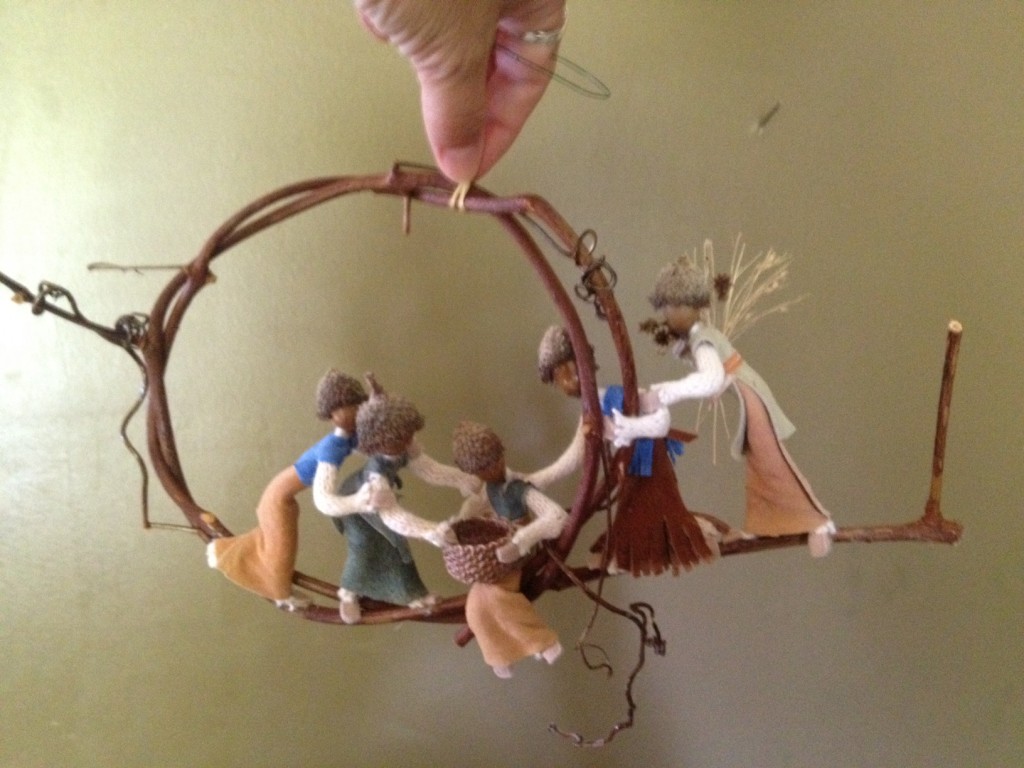
“That one,” I said. “I think I need to go home with that one. I AM that woman with the basket of sorrows.” I didn’t tell her what was in my basket, but I asked her to hold the piece until I’d decided whether I could afford to buy it.
On Thursday evening, there was levity and celebration in the opening celebration. I could hardly bear to be in the room. I spent most of the evening lying on my bed, alone in my room. I emerged only periodically to hear some of the stories that were being shared. Another woman shared how she, too, had taken the train and been subjected to lengthy delays.
Friday morning’s opening circle was beautiful and powerful. One by one we shared stories of how we’d come to be in this circle. Each of us placed a meaningful object in the centre of the circle and then added water we’d brought from our various homes into a collective bowl. When it came my turn to share, I added water that I’d brought from the graveyard where my son Matthew is buried and said that it felt like I was carrying a vial of tears with me. I said nothing about my mom. Something told me to hold that story close for the time being.
In the afternoon, I lead a workshop on storytelling, courage, and community. The women were invited to break into small circles of three to share stories of times in their lives when they’d had courage and times in their future when courage would be required of them. Out of those stories, they chose words and phrases to put onto prayer flags to take home and remind themselves of how the community supports their courage.
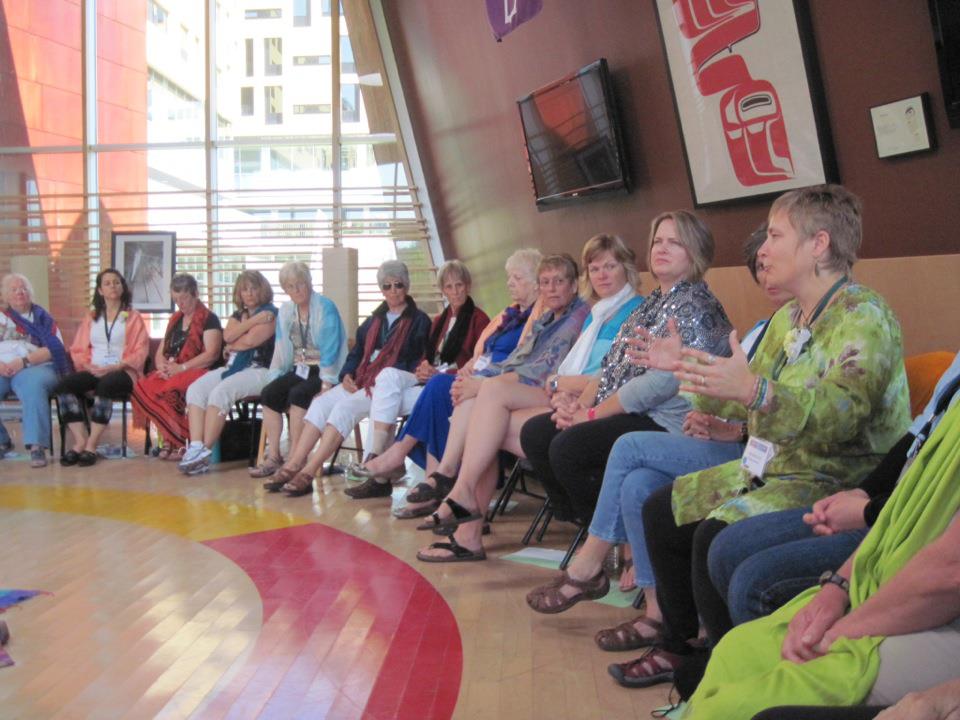
I didn’t participate in the story-sharing. Instead, I walked around with my camera, taking pictures of the beautiful faces as they softened and grew more vulnerable within the safe circles of trust.
Before the weekend ended, I bought the art piece of the woman with the basket of sorrows. Though it felt like more money than I could justify spending on myself, I knew I needed to take it home with me.
As the weekend progressed, I found my spirits lightening despite the heaviness in my chest. I was able to celebrate and dance and sing around the campfire. On Saturday afternoon, together with my delightful and spontaneous friend and mentor Diane, I went swimming in my clothes in the river that runs through the centre of Trent University. We convinced our new young friend Lindsay to join us. It was a lovely moment of lightness and joy.
As we drew nearer to the closing circle on Sunday morning, I contemplated whether or not to share the story of my Mom with the circle. I was a little conflicted. As one of the hosts of the gathering, I was somewhat reluctant to draw too much attention to myself, and yet as a member of the circle, it didn’t feel right to leave the circle without entrusting them with my pain. The beauty of the circle is that we all hold equal positions and one’s pain or joy is as important as another’s.
Just before the closing circle, one of the women with whom I hadn’t spoken much approached me. “You are a gifted woman, and you give so much to the group,” she said. “And yet there’s a sadness in your eyes. I want to honour whatever it is that gives you sadness.” At that moment, I knew I needed to share.
It took quite awhile for the talking piece to make its way to me. As it traveled, I listened deeply to the stories that were shared. So many women were going home with renewed courage and hope and strength after being part of the circle. It was a beautiful thing to behold.
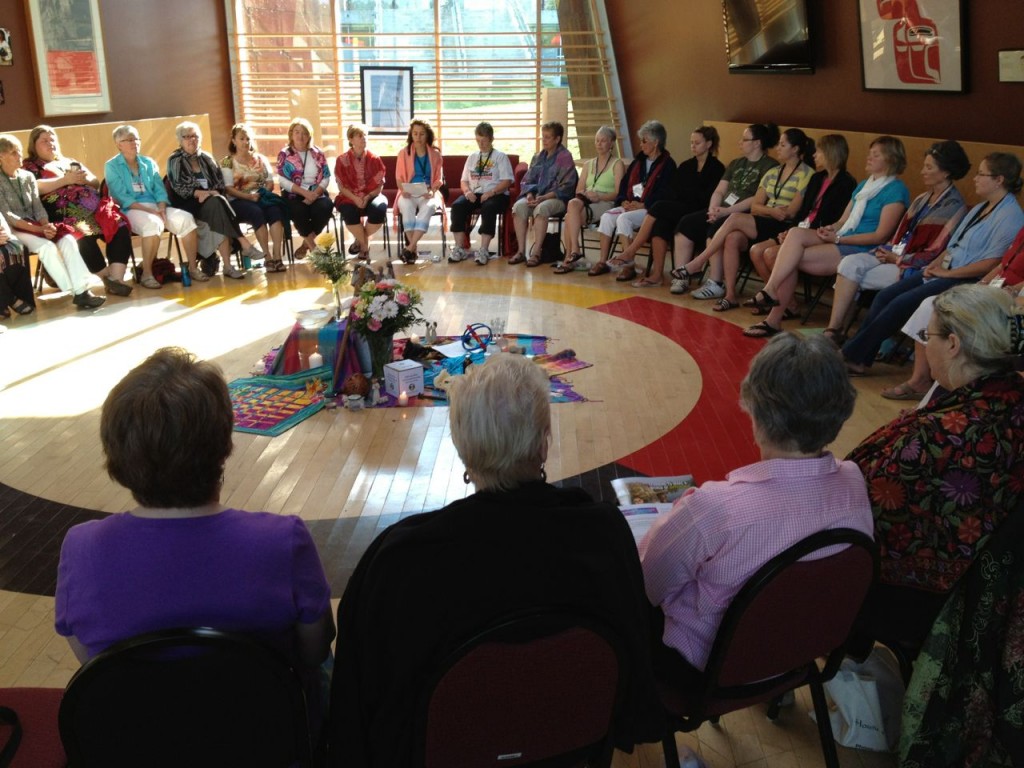
When it came my turn, I began by saying that I felt like I’d just been held in the arms of the Great Mother. “I am conflicted,” I said. “It is always so exciting for me to come to an event like this, because I know that this is my calling – to be in places like this, and to teach more people about storytelling, circles, courage, and community. I want to go home and do big things – teach, write and speak. And yet I have received a new calling this weekend – one that I am much more reluctant to follow.”
And then I shared the news I’d gotten – that my own mother might not be with me much longer. “My calling now,” I said, “is not to do big things, but to do small things – to sit in circle with my mother and be with her as she journeys toward the end of her life here with us.”
I held my water vial up and said “before we meet again, there will be many more tears in this vial.” I looked around the room and saw that nearly every woman in the circle had tears in her eyes. My pain had become their pain.
What an incredibly moving thing it is to know that you don’t cry alone! I am surrounded, in that circle and in the circles I returned to when I came back home, with so much love and community.
Yes, I am a woman who has been dealt a basket of sorrows (as is my mom, my sister, my mom’s sister, my sisters-in-law, and the other women who surround my mom – and of course there are many men in that circle too), but I know that I don’t have to carry it alone, and for that I am immensely grateful.
On Monday, the day after Gather the Women ended, my sister and I went to see the oncologist with my Mom and her husband. There we were told that Mom may be with us for six months or more, but probably less than a year. She has the option of taking more chemo treatments, but that will merely prolong her life somewhat and not stop the growth of the cancer. In the coming months, we need to prepare for her journey into the next life.
I didn’t take the train home on the return trip, and yet I know that there is a long and arduous journey ahead of me in the coming months. I also know that that journey will have intermittent moments of peace, beauty, and grace, just like my train ride did.
This I know – we are surrounded by love and we are held in the arms of the Great Mother/Father. May I continue to trust in that.
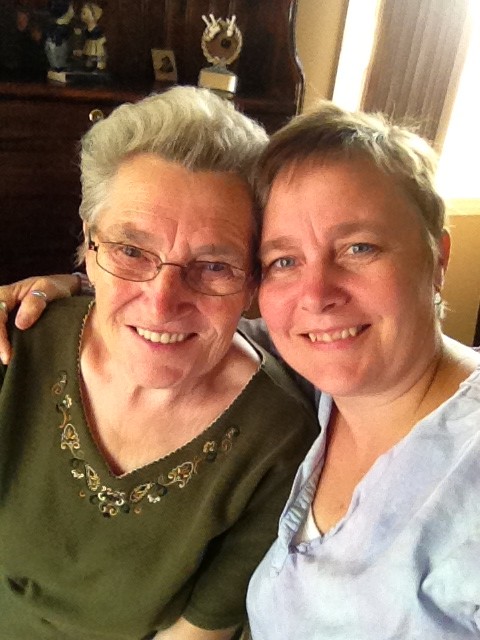
Mom and me
by Heather Plett | Apr 9, 2012 | Beauty, Easter, family, journey, Let go of the ground, Trust

I love Easter. There is so much good in it. There’s something about the resurrection story, and the many little reminders nature offers us at this time of year of how new things are born out of last year’s death that keeps me coming back to faith.
By the end of almost every Easter weekend, after the Easter services, the time with family, the great food, and the easter egg hunts, I’m in a happy, contemplative mood.
Almost every year… except last year.
Last Easter was horrible. Epically horrible.
On Maunday Thursday – my mom’s birthday – we received confirmation that my mom had cancer. A fairly serious kind in her internal organs that had way too many unknowns for our comfort.
Three days later, on Easter Sunday, my 18 year marriage unraveled. On the way home from an Easter “celebration” with my family, I told my husband that it was either time for us to live apart, or else we’d need to find someone who could help us overhaul our severely broken relationship. It just wasn’t working anymore. We’d forgotten how to communicate and I was tired of feeling angry, hurt, and lost.
I did a lot of crying in the weeks after Easter.
Ironically, a month before Easter, I’d started a series on my blog called “Let go of the Ground“, about how we are all called to surrender – to the Mystery, to the God of our understanding, to our calling, to Love. The premise was that – like the caterpillar who must surrender to the cocoon and enter the difficult transformation process before becoming a butterfly – we too must surrender and learn to trust what is emerging for us. I interviewed a bunch of wise people about their own surrender stories, and I was preparing to create an e-course on the subject. It felt like important work and I knew I had some wisdom to share, having experienced groundlessness and transformation many times in my life.
But then… Easter came, and groundlessness wasn’t just a topic for a blog post. I was living it all over again, and not by choice. The ground had been whipped out from under me and I was plunging through space without a parachute.
It’s easy to talk about surrender when you’re on the far side of transformation and you know what it feels like to fly. It’s another thing entirely when you’re in the messy, gooey chrysalis stage, you’re hanging by a fragile thread, and you have no idea when and how you will emerge.
The months after Easter continued to be hard. Mom started chemo, lost all of her hair, got continually sicker, went for surgery in the summer, and then spent a few more months in chemo. Normally an energetic, young-for-her-age woman who takes delight in climbing trees with her grandchildren and being the fastest one (and sometimes the only one) up the climbing wall when she goes to seniors’ camp in the summer, Mom could hardly handle the many hours she was forced to spend sitting or lying around. I could see her muscles twitch when someone else was in HER kitchen making food for her.
As for my marriage… we agreed that it was best for the kids if we stayed in the same house while we tried to repair what was broken. Like a couple of brick-layers trying to rebuild after a tsunami has wiped out the village, we gathered the pieces that still looked like viable relationship-building bricks, added a few new ones, and started piecing them together slowly but surely. Fortunately, we found a counsellor who was good at helping us do that.
Now it’s a year later, and I’d be lying if I told you I feel like a butterfly with freshly dried wings, fluttering effortlessly through the air. No, there’s lots of effort still involved, and lots of unknowns. I still feel pretty groundless.
But things are changing, and Spring has come again. When we rake away the dead leaves of last year, we see the tiny shoots poking their way out of the dirt built from many deaths in seasons past.
My mom started baking buns again last week, a sure sign that some of her energy is coming back. (When she starts distributing them to everyone in the neighbourhood who could use some nourishment, we’ll know she’s truly back.) Her chemo is finished, and it appears that the cancer has been halted for now. She cooked us a big meal for Easter and we celebrated together. True to form, she’s headed off on a trip with her husband later this week, headed to places where tulips bloom in rows and rows of wild and glorious colour.
Though it’s not perfect, my marriage feels much more stable than it did a year ago. We’re finding new ways of being truthful with each other and we’re working on rebuilding our trust. It feels hopeful, like there’s something worth fighting for. There are enough salvageable bricks that we can build a relationship that is better but still carries with it the stories of the old one.
It’s because of these stories that I continue to believe in the resurrection. Life comes out of death. Hope emerges out of darkness. Beauty follows surrender. God makes good things grow when we let our egos die.
There are many, many people who will try to tell you otherwise. They’ll try to sell you magic. They’ll try to tell you that life can be easy if you have enough positive thoughts and you surround yourself with people who are always happy, happy, happy. They’ll insist that if you attract good things, you won’t have to suffer.
I’m here to tell you that those people are telling you half-truths. Don’t get caught up in their deception no matter how convincing they are. They’re snake oil salespeople trying to make a quick buck out of your desire for an easy life.
Easiness is not the path to true happiness. Surrender is.
It’s not that I don’t believe in miracles – I do. I’ve seen them happen many, many times.
But the best kind of miracles are those that show up in the middle of the grit and suffering and messiness of life. The best kind of miracles are the hugs from friends when you need it most, the breathtaking sunset that brings tears to your eyes, the offering of support when you feel like you’ll crumble, the first crocus of the season – blooming despite the threat of frost, the fresh baked buns after a year of cancer, the tender touch of a loved one after you’ve regained trust, and the butterfly that flutters past when you’re lost in the woods.
The best kind of miracles don’t take you out of the suffering or make you immune to it, they simply help you bear it.
We need the suffering if we’re going to get to true beauty. We need the dying compost if we’re going to get crocuses in the Spring. We need the gooey chrysalis if we’re going to learn to fly.
Without the death, we wouldn’t get to celebrate the resurrection.
by Heather Plett | Oct 10, 2011 | family
 I’ve spent about 15 hours over the last 4 days typing 43 pages of Dutch names, birthdays, and wedding dates.
I’ve spent about 15 hours over the last 4 days typing 43 pages of Dutch names, birthdays, and wedding dates.
After painstakingly researching and compiling (with no computer literacy, I might add, just phone calls and reams of paper) eight generations of his family tree, my Mom’s husband hired me to type it all onto neat pages so that he can slip them into the plastic sleeves of his red duotang.
This is not my history and the names are unfamiliar, but I have found this exercise oddly enjoyable. For one thing, it’s a task I can do without a lot of thought, which gives me a little break from some of the over-thinking I do in many of my other tasks.
Though I don’t profess a lot of interest in genealogy, there is something comforting and rather grounding about these long branches of a family tree originating from one name a century and a half ago and then stretching out through the generations into the future.
As I type each name, I imagine it somehow mattering to each person that his or her name is there. Perhaps Anna feels a little twinge of happiness when her name appears on my computer screen, half a world away (most of the branches remain in their Dutch homeland). Perhaps Gerrit suddenly and inexplicably feels a sense of rootedness, and maybe even a longing to call a relative he hasn’t spoken to in a long time.
Perhaps I’ve been able to bless them somehow by attaching their names to this lineage through the ages.
As I read their names, I wonder about their stories. Did they like being part of this family tree? Did it matter to them? Or did they feel like misfits in a family where everyone else had a strong sense of belonging?
It’s the misfits I find myself most interested in. Not many layers of a person’s story show up on a family tree, but there are some that do. I wonder about those people who never had children and the branch ended with them. Did they want it that way or was it a matter of circumstances? How did they feel in a family surrounded by child-bearing relatives?
What about those who stayed single? Was that a happy choice or a lifelong trial? Did they find love in other kinds of relationships that didn’t conform to the family standards? Did they enjoy the solitude and freedom their singleness afforded?
And then I wonder about the secrets hidden behind the facts. Which people were living false lives, following the conventions of their culture? Which marriage was merely a cover for a repressed desire to love a person of the same gender? Which children were born out of a need to live up to expectations rather than a desire to be parents?
I wonder too about names. It’s striking how quickly a marriage wipes out a woman’s surname and changes that branch of the tree forever with a new name. When they marry outside the Dutch heritage, the family tree seems to imply that they cease to be Dutch. Does that matter? Is it something the new women’s movement should care about?
And then I find myself wondering about lineage in general. What kind of lineage matters? Do only the tendrils of our lives that connect us to our family history and culture matter? Or are there other lineages that we choose to be part of that make more difference – the lineages of our faith traditions, our vocations, our passions, our communities, our chosen families, and our spiritual practices? How much of life is a matter of our own choosing and how much is it a matter of simply accepting what comes?
I have no conclusions for this post, just a lot of meandering down the branches of a family tree that is not my own.
by Heather Plett | May 25, 2009 | family
These three beautiful people call me mom.
 And this man calls me wife.
And this man calls me wife.
 Could I possibly be more lucky?
Could I possibly be more lucky?
by Heather Plett | Jul 1, 2008 | family, summer

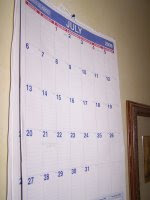 Notice any difference between the months? In June, we had to colour code the calendar because there were so many days that two or three family members had to be in different places at the same time. And July? Well, we flipped the page, and suddenly there is a blank slate ahead of us. Ahhhhh… how I love blank slates!
Notice any difference between the months? In June, we had to colour code the calendar because there were so many days that two or three family members had to be in different places at the same time. And July? Well, we flipped the page, and suddenly there is a blank slate ahead of us. Ahhhhh… how I love blank slates!
We started off on the right foot with a trip to the beach yesterday, and a family bike trip to the Forks for Canada Day celebrations today. (That’s a 22 kilometre round trip! The longest we’ve done as a family.)
It’s hot, hot, hot, and we’re tired, tired, tired (in fact, Marcel is lying on the couch next to me snoring right now), but we’re oh so happy that it’s summer!
Happy Canada Day and Happy Summer!

by Heather Plett | Oct 5, 2007 | family
As I tried to relax in the bathtub last night, I heard this conversation:
“Who put the cauliflower on the shelf where the milk is supposed to be?”
“Not me!”
“I did! Because SOMEBODY had stuck the cauliflower where it got in the way of closing the door!”
“Well don’t blame ME!”
“Why would you put the cauliflower THERE?! That’s a stupid place for cauliflower!”
“Why are you always blaming ME for EVERYTHING?”
“Well where am I supposed to put the milk now?”
“That’s YOUR problem! I cleaned my share of the table!”
Sigh. Is it just me, or does your family also enjoy arguing so much that they can fight over cauliflower and milk? If you’re one of those really evolved families that calmly discusses everything and ALWAYS settles disputes without any raised voices, please walk away now or I may have to hurt you.
 It seems appropriate and metaphorical that my journey to the Gather the Women event I was co-hosting was a long and arduous journey, and yet filled with moments of beauty and grace. The thirty-five hours I’d planned to spend on a train turned into forty-five and a half. I’d looked forward to the many hours of reading, writing, contemplation, and staring out the window (especially after the hard week before), but there’s only so much of that a person can take before the body begins to complain.
It seems appropriate and metaphorical that my journey to the Gather the Women event I was co-hosting was a long and arduous journey, and yet filled with moments of beauty and grace. The thirty-five hours I’d planned to spend on a train turned into forty-five and a half. I’d looked forward to the many hours of reading, writing, contemplation, and staring out the window (especially after the hard week before), but there’s only so much of that a person can take before the body begins to complain.








